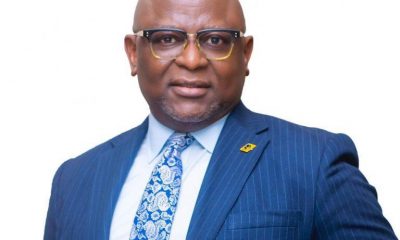Business
Nigerians in Diaspora comes hard on Buhari with harsh tag ”NigeriansAreNotCriminal”

Pres. Buhari on his visit to London last week made some statements during an interview with British Journalist which some Nigerians, Home and abroad found absurd.
They accused him of labelling them as criminals.
He added that because of the number of Nigerians imprisoned for law-breaking in Britain and elsewhere, they were also unlikely to get much sympathy.
Reacting to this, Some Nigerians have launched a Harshtag on social media; ”#NigeriansAreNotCriminals”.
One of the angry citizens,Tony Osborg wrote on Facebook:
My name is Ossai Tony Osborg. I am a Nigerian from Aboh Kingdom of Delta State. I am a graduate of Philosophy. I am a fellow at the Chartered Institute of Management. I am a Project Manager, Website Designer, Bid Documentation Expert, Public Relations Consultant and an Author. I have contributed in my little way to the development of my community and Nigeria and I have equally contributed to the field of knowledge in the world stage. I am a Nigerian and I love Nigeria even though Nigeria does not seem to love me. I am not a criminal. #NigeriansAreNotCriminals
Other Nigerians resident in the United Kingdom have launched a hashtag attacking the president for labeling them criminals.
My name is Obinna D. Ogbuagu. I am a Legal Practitioner practicing in Nigeria for over sixteen years now. I pay my tax regularly and have contributed in my own way to national development. I am not a criminal. #NigeriansAreNotCriminals
Reacting to the statement Portia Emilia Anthony wrote: “My name is PMB (Portia Means Business) not the PMB that said we all are criminals. I am a business lady. I sell Vessels, refined products (downstream). I am a hardworking, honest, compassionate Nigerian, I must add I have integrity. I am a decent Nigerian that has Nigeria first and foremost as paramount in my heart in all I do. I live both in Nigeria and UK. I am not a criminal and would never be. I stand with Nigerians to say #WeAreNotCriminals.”
When President Muhammadu Buhari took over power in May 2015, many Nigerians expected him to wave a wand and bring about change. They felt that their votes had hired the right man who would immediately fix all that was wrong with our country.
But now Buhari has formed the habit of denigrating his fellow countrymen.
For example, while delivering a speech to commemorate Nigeria’s 55 years of independence from the UK on 1 October, President Buhari made clear his view of the citizens calling them “unruly”.
While he invited every Nigerian to share the burden of change with him he said, “We must change our lawless habits… We must change our unruly behaviour… To bring about change, we must change ourselves.”
Two days ago in the United Kingdom Nigeria’s president again warned his fellow citizens to stop trying to make asylum claims in Britain, saying that their reputation for criminality has made it hard for them to be “accepted” abroad.
Muhammadu Buhari, the tough ex-general elected last year, said those who had joined the migrant exodus to Europe were doing so purely for economic reasons rather than because they were in danger.
Someone did rebrand Nigeria as “Good people great nation”. That is how it should be. A good CEO promotes his brand no matter what, a good president should promote his country no matter what too. #NigeriansAreNotCriminals
Mr Buhari, 73, made his remarks in a wide-ranging interview during a three-day trip to London, where he was among world leaders attending Thursday’s international conference on the Syrian crisis and the ongoing war on terror.
“We have an image problem abroad and we are on our way to salvage that”
“Some Nigerians claim is that life is too difficult back home, but they have also made it difficult for Europeans and Americans to accept them because of the number of Nigerians in prisons all over the world accused of drug trafficking or human trafficking,” he told The Telegraph.
“I don’t think Nigerians have anybody to blame. They can remain at home, where their services are required to rebuild the country.”
But according to Okey Okpala; “I am a lawyer, A serious lawyer at that. I work my ass out and keep calling another fellow My Lord on daily basis in other to make a living. I make a living standing on my feet and solving other people’s problems. I have no criminal record. I am a Nigerian. #IAmNotACriminal”
A UK based solicitor told Elombah.com, “Nearly one in ten of the 11,000 foreign prisoners clogging up our overcrowded jails are from one country. An official figure shows that 989 are from Poland. The next worst offenders are Ireland, Jamaica and Romania followed by Pakistan, Lithuania and Nigeria. Further down the list are Somalia, India, Albania and Bangladesh. Yet none of these countries leaders have come to this place to label their nationals CRIMINALS”.
Indeed, a UK Home office publication stated that 11,719 foreign criminals are either in jail, in immigration detention centres or at large. In total, 177 nations are represented on the list, entitled the Foreign National Offender Caseload.
When ordered by nationality, Jamaica comes out on top: 1,026 Jamaicans from a total population in Britain of 47,000 Jamaican nationals have been convicted of crimes. Nigerians and Polish are next on the list, accounting for 832 and 679 convicted criminals of those nationalities respectively, but from much larger immigrant populations.
Eze Eluchie’s reaction was more acidic. He wrote on Facebook: “The President of a Republic of Criminals is certainly a Presidential Criminal! Mr. President in the same interview with the British Daily Telegraph asked Nigerians to stay back in Nigeria whilst his children all schooled in the UK and have residency there. Mr. President, sir, the Nigerians I know living abroad, are not criminals. But you, ‘saint’ Muhammadu Buhari, are a hypocrite!
Bank
Alpha Morgan to Host 19th Economic Review Webinar

Alpha Morgan to Host 19th Economic Review Webinar
In an economy shaped by constant shifts, the edge often belongs to those with the right information.
On Wednesday, February 25, 2026, Alpha Morgan Bank will host the 19th edition of its Economic Review Webinar, a high-level thought leadership session designed to equip businesses, investors, and individuals with timely financial and economic insight.
The session, which will hold live on Zoom at 10:00am WAT and will feature economist Bismarck Rewane, who will examine the key signals influencing Nigeria’s economic direction in 2026, including policy trends, market movements, and global developments shaping the local landscape.
With a consistent track record of delivering clarity in uncertain times, the Alpha Morgan Economic Review continues to provide practical context for decision-making in a dynamic environment.
Registration for the 19th Alpha Morgan Economic Review is free and can be completed via https://bit.ly/registeramerseries19
It is a bi-monthly platform that is open to the public and is held virtually.
Visit www.alphamorganbank to know more.
Business
GTBank Launches Quick Airtime Loan at 2.95%

GTBank Launches Quick Airtime Loan at 2.95%
Guaranty Trust Bank Ltd (GTBank), the flagship banking franchise of GTCO Plc, Africa’s leading financial services group, today announced the launch of Quick Airtime Loan, an innovative digital solution that gives customers instant access to airtime when they run out of call credit and have limited funds in their bank accounts, ensuring customers can stay connected when it matters most.
In today’s always-on world, running out of airtime is more than a minor inconvenience. It can mean missed opportunities, disrupted plans, and lost connections, often at the very moment when funds are tight, and options are limited. Quick Airtime Loan was created to solve this problem, offering customers instant access to airtime on credit, directly from their bank. With Quick Airtime Loan, eligible GTBank customers can access from ₦100 and up to ₦10,000 by dialing *737*90#. Available across all major mobile networks in Nigeria, the service will soon expand to include data loans, further strengthening its proposition as a reliable on-demand platform.
For years, the airtime credit market has been dominated by Telcos, where charges for this service are at 15%. GTBank is now changing the narrative by offering a customer-centric, bank-led digital alternative priced at 2.95%. Built on transparency, convenience and affordability, Quick Airtime Loan has the potential to broaden access to airtime, deliver meaningful cost savings for millions of Nigerians, and redefine how financial services show up in everyday life, not just in banking moments.
Commenting on the product launch, Miriam Olusanya, Managing Director of Guaranty Trust Bank Ltd, said: “Quick Airtime Loan reflects GTBank’s continued focus on delivering digital solutions that are relevant, accessible, and built around real customer needs. The solution underscores the power of a connected financial ecosystem, combining GTBank’s digital reach and lending expertise with the capabilities of HabariPay to deliver a smooth, end-to-end experience. By leveraging unique strengths across the Group, we are able to accelerate innovation, strengthen execution, and deliver a more integrated customer experience across all our service channels.”
Importantly, Quick Airtime Loan highlights GTCO’s evolution as a fully diversified financial services group. Leveraging HabariPay’s Squad, the solution reinforces the Group’s ecosystem proposition by bringing together banking, payment technology, and digital channels to deliver intuitive, one-stop experiences for customers.
With this new product launch, Guaranty Trust Bank is extending its legacy of pioneering digital-first solutions that have redefined customer access to financial services across the industry, building on the proven strength of its widely adopted QuickCredit offering and the convenience of the Bank’s iconic *737# USSD Banking platform.
About Guaranty Trust Bank
Guaranty Trust Bank (GTBank) is the flagship banking franchise of GTCO Plc, a leading financial services group with a strong presence across Africa and the United Kingdom. The Bank is widely recognized for its leadership in digital banking, customer experience, and innovative financial solutions that deliver value to individuals, businesses, and communities.
About HabariPay
HabariPay is the payments fintech subsidiary of GTCO Plc, focused on enabling fast, secure, and accessible digital payments for individuals and businesses. By integrating payments and digital technology, HabariPay supports innovative services that make everyday financial interactions simpler and more seamless.
Enquiries:
GTCO
Group Corporate Communication
[email protected]
+234-1-2715227
www.gtcoplc.com
Business
BUA Group, AD Ports Group and MAIR Group Launch Strategic Plan for World-Class Sugar and Agro-Logistics Hub at Khalifa Port

BUA Group, AD Ports Group and MAIR Group Sign MoU to Explore Collaboration in Sugar Refining, Agro-Industrial Development, and Integrated Global Logistics Solutions
Abu Dhabi, UAE – Monday, 16th February 2026
BUA Group, AD Ports Group, and MAIR Group of Abu Dhabi today signed a strategic Memorandum of Understanding (MoU) to explore collaboration in sugar refining, agro-industrial development, and integrated global logistics solutions. The partnership aims to create a world-class platform that strengthens regional food security, supports industrial diversification, and reinforces Abu Dhabi’s position as a hub for trade and manufacturing.
The proposed collaboration will leverage BUA Group’s industrial and logistics expertise, Khalifa Port’s world-class infrastructure, and AD Ports Group’s operational experience. The initiative aligns with the objectives of the UAE Food Security Strategy 2051, which seeks to position the UAE as a global leader in sustainable food production and resilient supply chains. It also aligns with Nigeria’s food production- and export-oriented agricultural transformation agenda, focused on scaling domestic capacity, strengthening value addition, improving post-harvest logistics, and unlocking new markets for Nigerian produce across the Middle East, Asia, and beyond.

Photo Caption: L-R: Kabiru Rabiu, Group Executive Director, BUA Group; Cpt. Mohammed J. Al Shamisi, MD/Group CEO, AD Ports Group; Saif Al Mazrouei, CEO (Ports Cluster) AD Ports Group; Abdul Samad Rabiu, Founder/Executive Chairman, BUA Group; and Steve Green, Group CFO, MAIR Group
Through structured aggregation, processing, storage, and maritime export channels, the partnership is designed to reduce supply chain inefficiencies, enhance traceability and quality standards, and also create a predictable trade corridor between West Africa and the Gulf.
BUA Group—recognised as one of Africa’s largest and most diversified conglomerates, with major investments across sugar refining, food production, flour milling, cement manufacturing, and infrastructure- brings extensive industrial expertise and large-scale operational capability to the venture. MAIR Group will provide strategic support in developing integrated logistics and agro-industrial solutions, creating a seamless platform for production, storage, and distribution.
Abdul Samad Rabiu, Founder and Chairman of BUA Group, said:
“This MoU marks an important milestone in BUA’s international expansion and reflects our long-term vision of building globally competitive industrial platforms. Together with AD Ports Group and MAIR Group, we aim to develop sustainable food production and logistics solutions that strengthen regional supply chains and support the UAE’s Food Security Strategy 2051.”
He further added that, “This partnership represents not just a commercial arrangement but a strategic food corridor anchored on shared economic ambition, resilient infrastructure, and disciplined execution, reinforcing long-term food security objectives for both nations.”
A representative of MAIR Group added:
“This collaboration underscores our commitment to advancing strategic industries in Abu Dhabi and building integrated solutions that reinforce the UAE’s position as a global hub for trade, food security, and industrial excellence.”
A spokesperson from AD Ports Group commented:
“Our partnership with BUA Group and MAIR Group highlights Khalifa Port’s role as a catalyst for high-impact industrial investments. This initiative will enhance regional food security, strengthen global trade connectivity, and support Abu Dhabi’s economic diversification goals.”
This MoU marks a historic collaboration that combines world-class infrastructure, industrial expertise, and strategic vision, setting the stage for a sustainable and resilient food and logistics ecosystem that will benefit the UAE, the region, and global markets alike.
-

 celebrity radar - gossips6 months ago
celebrity radar - gossips6 months agoWhy Babangida’s Hilltop Home Became Nigeria’s Political “Mecca”
-

 society6 months ago
society6 months agoPower is a Loan, Not a Possession: The Sacred Duty of Planting People
-

 news6 months ago
news6 months agoTHE APPOINTMENT OF WASIU AYINDE BY THE FEDERAL GOVERNMENT AS AN AMBASSADOR SOUNDS EMBARRASSING
-

 society5 months ago
society5 months agoReligion: Africa’s Oldest Weapon of Enslavement and the Forgotten Truth









You must be logged in to post a comment Login